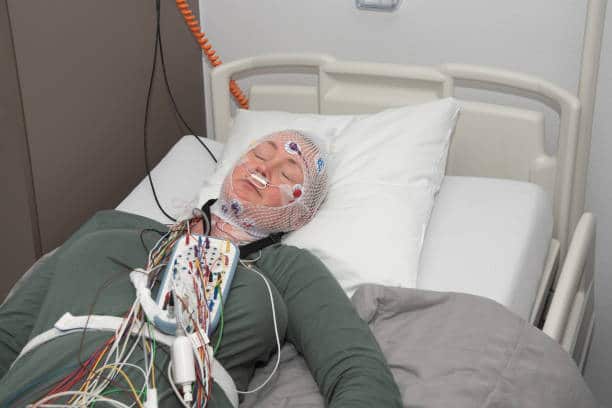Sleep disorders can significantly impede our daily lives, affecting our energy levels, mood, and overall health. As we age, the likelihood of experiencing a sleeping disorder increases, emphasizing the importance of accurate diagnosis and effective treatment.
Sleep studies play an integral role in sleep medicine by identifying these disorders, helping doctors understand our sleep patterns, and fully implementing appropriate interventions. However, the costs associated with these studies can often become a concern for many individuals, especially those in their middle age and beyond.
This is where Medicare comes in. As a federal program designed to assist senior citizens with their healthcare costs, Medicare can play a vital role in covering the expenses related to sleep studies. Understanding what Medicare covers and doesn’t is essential to managing your healthcare and finances.
This article aims to provide a comprehensive guide on what aspects of medicare sleep study costs are covered by Medicare to aid you in navigating the often complex landscape of healthcare financing.
Understanding Sleep Studies

If you’ve ever wondered what happens while you’re fast asleep, a sleep study is a way to find out. It’s like having a CCTV for your body’s internal nighttime operations. These studies, also known as polysomnography, are comprehensive tests where specialists monitor your physical activities during sleep. They’re like your personal sleep detectives, unearthing the root causes of your sleep troubles, whether sleep apnea, insomnia, restless leg syndrome, or even narcolepsy.
Now, don’t let the term “study” give you flashbacks of school exams. Sleep studies are more straightforward than they sound. A sleep specialist will typically evaluate your symptoms and decide if a sleep study is necessary.
Depending on the type, you may either stay overnight at a sleep center (think of it as a mini vacation for your health) or conduct it yourself at home with a provided kit. It’s all about making the experience as comfortable as possible while capturing crucial data to help you achieve a good night’s sleep.
Related Article: Understanding Your CPAP Sleep Study Results
Overview of Medicare
Medicare is a federal health insurance program in the United States that primarily aids individuals aged 65 and older and some younger individuals with certain disabilities or health conditions. The design of the coverage takes into account age, income, and qualifying situations.
Medicare consists of different parts, each of which covers specific healthcare services.
Part A, often called hospital insurance, covers inpatient hospital stays, care in a skilled nursing facility, hospice care, and home health care. As of 2023, the Part A deductible is $1,600, and if you don’t qualify for premium-free Part A, the full premium is $506 per month.
Part B, known as medical insurance, covers specific doctor’s services, outpatient care, medical supplies, and preventive services. In 2023, the Part B premium decreased to $164.90, with a deductible of $226. Please note that these premiums can vary based on income.
Part D provides prescription drug coverage; its premiums depend on income and marital status. Income-related monthly adjustments range from $0 to $76.40. Medicare will negotiate prices for 10 Part D drugs and cap insulin copays at $35. Moreover, vaccines recommended by the CDC will be free with prescription drug coverage.
In addition to these, Medicare Advantage (MA), also known as Part C, is an “all in one” alternative to Original Medicare (Part A and Part B). These “bundled” plans include Part A, Part B, and usually Part D. In 2023, the projected average premium for MA plans is $18 per month, an 8% decrease from 2022.
MUST READ: How Much Will A CPAP Sleep Study Cost Me
Medicare Coverage for Sleep Studies
Medicare Part B covers various sleep tests and devices, including Type I, II, III, and IV sleep studies, especially for individuals showing clinical signs of sleep apnea. After you meet your Part B deductible, you will be responsible for paying 20% of the Medicare-approved amount.
Doctors must order Type I tests, the most comprehensive sleep studies, and these are only covered when conducted in a sleep lab facility.
For both in-lab and home sleep tests and studies, healthcare providers use Types II, III, and IV devices, following specific coverage criteria set by CMS. Additionally, CMS guidelines and medical necessity requirements must be met for outpatient sleep studies to receive coverage.
When it comes to managing health concerns such as obstructive sleep apnea (OSA), it’s essential to understand the options covered under different health plans, including Medicare sleep study coverage. For those eligible, Medicare provides coverage for Out of Center Sleep Testing (OCST) under specific conditions and requirements. Education on the use of sleep monitors and continuous monitoring is a crucial aspect of the diagnostic process for OSA, and it’s imperative to discuss your symptoms with a healthcare professional. They can guide you on whether a Medicare-covered sleep study or other diagnostic tests are necessary for an accurate diagnosis and to ensure you receive the appropriate treatment under your plan.
National and local directives determine the coverage and reimbursement policies for sleep studies under Medicare. CMS establishes national coverage determinations (NCDs) for Medicare services, while Medicare Administrative Contractors (MACs) develop Local Coverage Determinations (LCDs) for specific regions. These regulations guide the processing of Part A and Part B claims.
It’s important to note that if your doctor recommends services more frequently than Medicare covers or suggests non-covered services, you may need to bear some or all of the costs.
Potential Out-of-Pocket Costs

When it comes to sleep studies under Medicare, you need to be prepared for potential out-of-pocket costs.
While Medicare Part B does cover sleep studies, it’s crucial to remember that you will be responsible for certain costs after meeting your deductible.
For instance, you will be responsible for 20% of the Medicare-approved amount for sleep studies.
Other factors could contribute to the out-of-pocket costs as well. These can include additional insurance coverage you may have, the doctor’s charges, whether the doctor accepts the assignment (meaning they agree only to charge you the Medicare-approved amount), and the type and location of the facility.
Additionally, if your doctor recommends services more frequently than what Medicare covers, or if they suggest services that Medicare does not cover at all, you could be responsible for some, if not all, of the costs.
Furthermore, while certain types of sleep monitors are covered for diagnosing obstructive sleep apnea (OSA) in various settings, the coverage might vary depending on the type of test and whether it’s conducted in a lab or at home.
Finally, you can appeal the decision if Medicare decides not to cover a sleep study. Before your sleep study, if you’re unsure whether Medicare will cover it, you can ask for a written advance coverage decision, also known as an “Advance Beneficiary Notice of Noncoverage” (ABN). This notice lets you decide whether to proceed with the sleep study tests and pay for it out-of-pocket or consider other options.
Maximizing Your Medicare Benefits for Sleep Studies
Maximizing your Medicare benefits for sleep studies requires a good understanding of the Medicare system and proactive communication with your healthcare providers. Here are a few steps you can take to make the most of your benefits:
Understand Your Medicare Sleep Study Coverage
Medicare Part B covers various sleep tests, including Type I, II, III, and IV sleep studies, for individuals with clinical signs of sleep apnea. However, coverage may vary depending on the type of test and whether it’s conducted in a lab or at home. Therefore, get familiar with what is covered and what isn’t to avoid unexpected costs.
Meet Your Part B Deductible
Before Medicare begins to cover the costs of your sleep study, you’ll need to meet your Part B deductible. In 2023, this deductible is $226. After you’ve met the deductible, you’ll typically pay 20% of the Medicare-approved amount for sleep studies.
Choose Providers that Accept Assignment
Doctors, providers, and suppliers that accept assignments agree to take the Medicare-approved amount as full payment for covered services. Choosing these providers can help reduce your out-of-pocket costs.
Consult with Your Doctor
If your doctor or healthcare provider recommends services more frequently than Medicare covers or suggests non-covered services, you may have to pay some or all of the costs. Always discuss these recommendations with your doctor to understand the necessity and explore covered alternatives if available.
Leverage Other Insurance
If you have other insurance covering sleep studies, such as Medigap (Medicare Supplement Insurance), use it to help cover the 20% cost that Medicare doesn’t cover.
Consider Medicare Advantage
Medicare Advantage Plans (Part C) may offer additional benefits not covered by Original Medicare (Parts A & B), potentially including more comprehensive coverage for sleep studies.
Know Your Rights
If Medicare denies coverage for a sleep study, you can appeal. Ask for an “Advance Beneficiary Notice of Noncoverage” (ABN) to understand why Medicare may not cover service and decide if you want to pay out-of-pocket.
What to Do if Your Sleep Study Isn’t Covered

If you find that Medicare doesn’t cover your sleep study, don’t despair. There are several steps you can take to mitigate the situation:
Double-Check with Medicare
Ensure you fully understand why Medicare isn’t covering your sleep study. Was there a clerical error? Was there a misunderstanding about your symptoms or diagnosis? You can call Medicare or check their website to clarify the situation.
Appeal the Decision
If you believe the sleep study should be covered based on Medicare’s guidelines and your medical condition, consider filing an appeal. Medicare has a formal appeal process that you can follow.
It’s essential to enlist the help of your healthcare provider during this process. They can provide necessary medical records and write a letter of medical necessity to support your appeal.
Consider Alternative Tests
If Medicare does not cover a specific type of sleep study, ask your doctor about alternative tests that Medicare might cover. For example, insurance may cover some home-based sleep studies when they cannot cover full polysomnography in a sleep lab.
Discuss Payment Plans with Your Provider
If your sleep study is still not covered and you decide to pay out-of-pocket, talk to your healthcare provider or sleep center about potential payment plans. Some providers offer sliding scale fees or installment payment plans to help make healthcare more affordable.
Explore Other Insurance Options
If you have additional insurance coverage, such as from a private insurance company or an employer-sponsored plan, check to see if these plans will cover your sleep study.
Similarly, consider enrolling in a Medicare Advantage Plan, which might offer coverage for sleep studies beyond what Original Medicare covers.
Seek Assistance from Nonprofit Organizations
Some nonprofit organizations can assist with medical costs. Though these are typically disease-specific, it’s worth investigating whether organizations can help.
Frequently Asked Questions
Does Medicare cover continuous positive airway pressure (CPAP)?
Yes, Medicare Part B covers CPAP therapy for individuals diagnosed with obstructive sleep apnea, and a Medicare sleep study is generally required for diagnosis. To ensure compliance with the latest policies, beneficiaries should consult the most recent Medicare guidelines for specific details and updates.
What does multiple sleep latency mean?
Doctors use the Multiple Sleep Latency Test (MSLT) to measure how quickly a person falls asleep in a quiet and comfortable environment during the day.
Conclusion
Understanding the complexities of Medicare coverage, especially when it comes to sleep studies, can indeed be a challenging task. But with some due diligence, navigating the maze of regulations and conditions is possible to ensure that you’re getting the most out of your benefits.
Remember that the coverage varies depending on several factors, from the type of sleep study to specific diagnostic criteria, and it’s crucial to collaborate with your healthcare provider to understand your options and obligations.
You should also consider the potential out-of-pocket costs and how to optimize your benefits. If, in the end, your sleep study isn’t covered, don’t be disheartened. There are steps to take, from appealing the decision to exploring alternative tests, payment plans, and other insurance options.
For those seeking to enhance their sleep study experience, browse our collection of CPAP accessories, which may offer additional comfort and support irrespective of insurance coverage.”
Thanks for reading!




